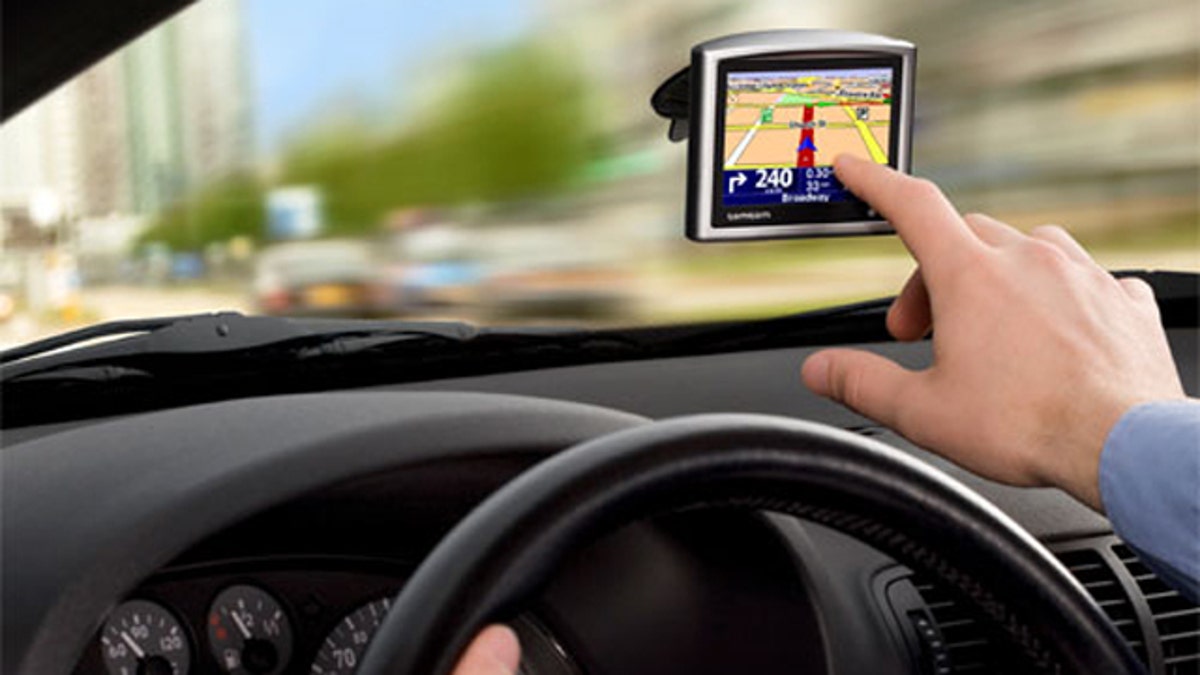
A windshield-mounted GPS helps a driver navigate. (Tom Tom)
The trouble with men is that they don't ask for directions -- right?
According to two new surveys, men and women are arguing about a lot more than just directions as they race headlong into the Memorial Day traffic and the summer driving season.
A nationwide survey of 610 U.S. drivers -- commissioned by navigation firm TeleNav -- uncovered what men and women really found annoying about their partners' driving habits. Men typically said that their better halves drove too slowly. And women complained that men tailgate.
As any married person knows, criticizing the other person's driving isn't conducive to a pleasant trip. When they were in the driver's seat, the largest percentage of men said the most irritating thing their spouse could do was tell them to slow down. For female drivers, what really sent them through the roof was when the male passenger criticized the route they chose.
Surprisingly, having to stop multiple times on a long trip didn't seem to be a major source of contention -- probably because eventually everyone has to make a bathroom stop. About 36 percent of women said they have to stop more than men in their life, while about 22 percent of men said they had to stop more often.
But the study wasn't about the battle of the sexes, Dariusz Paczuski, vice president of marketing at TeleNav, told FoxNews.com. "It's part of our effort to understand drivers because life happens in the car," he says.
Paczuski said U.S. drivers now spend between 2 and 3 hours behind the wheel every day and that the average work commute is now 50 minutes long. Furthermore, there are many serious implications that can be derived from the study, says Paczuski, including disturbing admissions about distracted driving.
"I'm a little horrified at how many people are grooming themselves and eating using a fork and spoon while driving," he said.
Indeed, 21 percent of the surveyed drivers said they had eaten a meal that required a fork or spoon while driving. Even more -- 23 percent -- confessed to driving with a dog in their lap.
Simply sitting fuming in traffic can be bad for you, according to another study out this week. Commissioned by the mapping and navigation firm TomTom, researchers questioned drivers about how much stress they felt behind the wheel. About 50 percent of men and 67 percent of women said they did not feel any more anxious after fighting traffic for 20 minutes.
However, the researchers measured chemical stress markers in the participants' saliva under those conditions and found that drivers -- particularly men -- underestimated how negatively the traffic was affecting them. Indeed, physiological tests showed that men suffered a 60 percent increase in their stress levels. Women only experienced a roughly 9 percent increase in stress.
TomTom, which launched a new live traffic feature in its U.S. portable navigation devices this month, points out that stress can have serious negative health effects, such as suppressed immune functions and high blood pressure. Apparently, we don't need to be told this.
In another TomTom survey of 9,865 drivers worldwide, American drivers indicated that they would rather do just about anything than sit in traffic. A whopping 92 percent of those surveyed, for example, said they would rather meet their in-laws for the first time than be stuck staring at taillights, while 75 percent said they would rather suffer through a dentist appointment.
A large percentage of women in the TeleNav study still said that the most frequent reason for anxiety and arguments is that the man won't pull over and ask for directions. But is this claim really true -- are men too proud to seek help even when they're lost? The TeleNav survey suggests perhaps not.
Just 32 percent of men confessed that they got lost more often than their spouse, compared to 52 percent of women who admitted that they were actually the ones who got lost more often. Furthermore, 81 percent of men felt they had a better sense of direction compared to just 45 percent of women who claimed the opposite.
Of course, this doesn't address the issue of what men do in those rare cases when they do become disoriented.
So whatever the truth is, at least it gives us something else to argue about in the car -- and perhaps distract from all that traffic congestion.
